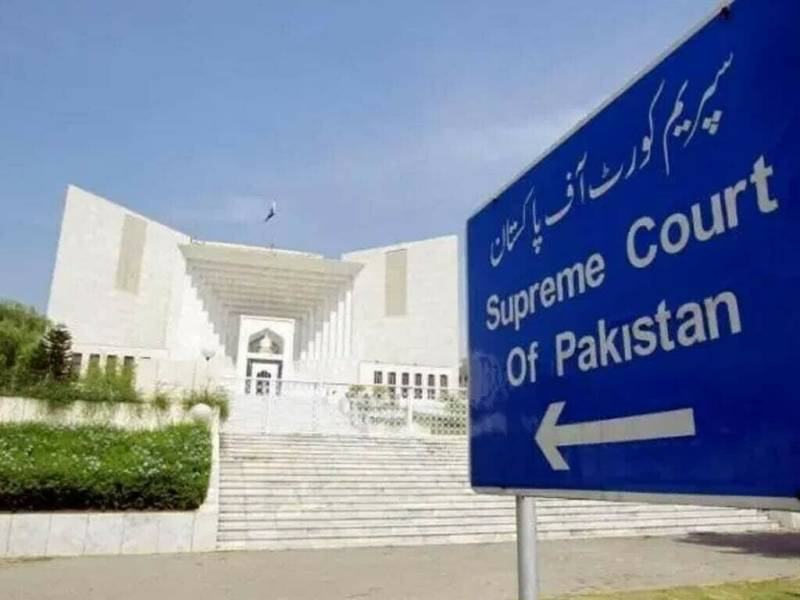Islamabad (Web Desk): The Supreme Court (SC) on Wednesday suspended its October 23 unanimous ruling, wherein it had nullified military trial of civilians involved in May 9 riots as null and void.
A six-member bench of the top court, headed by Justice Sardar Tariq Masood and comprising Justice Aminuddin Khan, Justice Muhammad Ali Mazhar, Justice Syed Hasan Azhar Rizvi, Justice Musarrat Hilali, and Justice Irfan Saadat Khan heard the set of intra-court appeals.
The verdict, announced on a set of intra-court appeals (ICAs) challenging its previous order, was made with a majority of 5-1 as Justice Musarrat Hilali objected to it.
The military court trials will be conditioned on the Supreme Court's final verdict on the intra-court appeals, the court order stated.
Subsequently, the court issued notices to the respondents and adjourned the hearing until the third week of January.
On October 23, a five-member special bench of the top court headed by Justice Ijazul Ahsan, and comprising Justice Munib Akhtar, Justice Yahya Afridi, Justice Sayyed Mazahar Ali Akbar Naqvi and Justice Ayesha Malik had declared the the trial of civilians in military courts as null and void.
The court in its short, by a majority of 4 to 1, had held that the trial of civilians under Section 2 D (i) (ii) of the Army Act was unconstitutional. The five-member bench had unanimously declared that civilians would be tried under ordinary criminal laws.
"Without prejudice to the generality of the foregoing the trials of civilians and accused persons, being around 103 persons who were identified in the list provided to the Court by the learned Attorney General for Pakistan by way of CMA No.5327 of 2023 in Constitution Petition No.24 of 2023 and all other persons who are now or may at any time be similarly placed in relation to the events arising from and out of 9th and 10th May, 2023 shall be tried by Criminal Courts of competent jurisdiction established under the ordinary and / or special law of the land in relation to such offences of which they may stand accused," read the written order.
Although the bench concluded that Section 2 D (i) (ii) was in contradiction with the Constitution, Justice Yahya Afridi reserved his decision.
Following the verdict, the federal and provincial governments of Balochistan, Punjab and Khyber Pakhtunkhawa had filed intra-court appeals challenging the ruling.
However, the Sindh govt had denied filing a purported plea on the same matter, which was not included among the petitions taken up today.
Meanwhile, the defence ministry had also moved an ICA before the SC against its judgment, requesting the apex court to suspend the verdict’s operation during the pendency of the appeal.
During the hearing today, objections were raised about the constitution of the bench, notably by Justice Ijazul Ahsan, highlighting discrepancies in its formation. He expressed concerns about the bench composition and its adherence to established procedures.
Former Chief Justice Jawwad S Khawaja, also a petitioner challenging the military trials, objected to the inclusion of Justice Sardar Tariq Masood in the bench.
He cited previous instances where both Justice Masood and Chief Justice Qazi Faez Isa had recused themselves from a similar case.
The bench, took up 17 ICAs. The Attorney General of Pakistan (AGP) Mansoor Awan urged the court to allow the conditional resumption of military trials for civilian suspects.
He said that the objections raised by the parties are baseless and urged the bench to hear the case on merit.
The hearing witnessed discussions on objections raised against the bench’s formation. Justice Masood declined to recuse himself, emphasizing that it was up to individual judges to decide on their participation.
The court accepted the AGP's request to begin hearing arguments on the appeals.
However, objections about the bench's constitution were raised by counsels representing various parties, expressing concerns over the inclusion of Justice Masood in the proceedings.
It is pertinent to mention that on May 9, alleged workers and supporters of the Pakistan Tehreek-e-Insaf (PTI) vandalized and set fire to state and army properties and memorials in the wake of the party chief's arrest by paramilitary troops from the premises of the Islamabad High Court (IHC).
Following the incidents of violence, the National Assembly had passed a resolution demanding that the rioters be tried under the Army Act.
A number of petitions were filed before the SC challenging the government’s decision to put May 9 suspects through military trials.
The petitioners included, Pakistan Tehreek-e-Insaf (PTI) chief Imran Khan, civil society members, senior politician Chaudhry Aitzaz Ahsan and former CJP Jawad S Khawaja.


